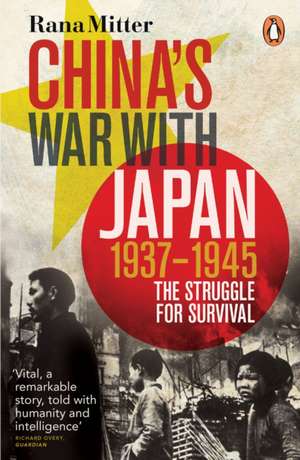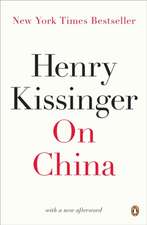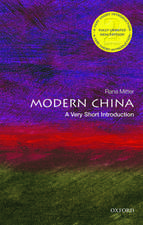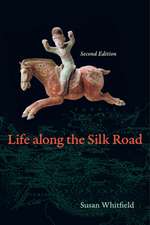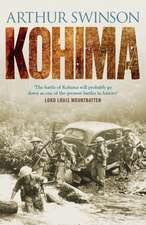China's War with Japan, 1937-1945: The Struggle for Survival
Autor Rana Mitteren Limba Engleză Paperback – 7 mai 2014
Different countries give different opening dates for the period of the Second World War, but perhaps the most compelling is 1937, when the 'Marco Polo Bridge Incident' plunged China and Japan into a conflict of extraordinary duration and ferocity - a war which would result in many millions of deaths and completely reshape East Asia in ways which we continue to confront today.
With great vividness and narrative drive Rana Mitter's book draws on a huge range of new sources to recreate this terrible conflict. He writes both about the major leaders (Chiang Kaishek, Mao Zedong and Wang Jingwei) and about the ordinary people swept up by terrible times. Mitter puts at the heart of our understanding of the Second World War that it was Japan's failure to defeat China which was the key dynamic for what happened in Asia.
Preț: 80.39 lei
Preț vechi: 95.53 lei
-16% Nou
Puncte Express: 121
Preț estimativ în valută:
15.38€ • 15.89$ • 12.80£
15.38€ • 15.89$ • 12.80£
Carte disponibilă
Livrare economică 07-18 martie
Livrare express 18-22 februarie pentru 39.66 lei
Preluare comenzi: 021 569.72.76
Specificații
ISBN-13: 9780141031453
ISBN-10: 014103145X
Pagini: 480
Ilustrații: 2 x 8pp b&w
Dimensiuni: 129 x 198 x 21 mm
Greutate: 0.35 kg
Editura: Penguin Books
Colecția Penguin
Locul publicării:London, United Kingdom
ISBN-10: 014103145X
Pagini: 480
Ilustrații: 2 x 8pp b&w
Dimensiuni: 129 x 198 x 21 mm
Greutate: 0.35 kg
Editura: Penguin Books
Colecția Penguin
Locul publicării:London, United Kingdom
Notă biografică
Rana
Mitter
is
Professor
of
the
History
and
Politics
of
Modern
China
at
the
University
of
Oxford
and
a
Fellow
of
St
Cross
College.
He
is
the
author
ofA
Bitter
Revolution:
China's
Struggle
with
the
Modern
World.
He
is
a
regular
presenter
ofNight
Waveson
Radio
3.
Recenzii
The
best
study
of
China's
war
with
Japan
written
in
any
language
...
comprehensive,
thoroughly
based
on
research,
and
totally
non-partisan.
Above
all,
the
book
presents
a
moving
account
of
the
Chinese
people's
incredible
suffering
...
A
must
read
for
anyone
interested
in
the
origins
of
China's
contribution
to
the
making
of
today's
world
A major contribution to the one aspect of the Second World War of which we know far too little, and should know much more if we are to understand the new superpower today ... a model of clarity and good writing
[Mitter] restores a vital part of the wartime narrative to its rightful place. Now, for the first time, it is possible to assess the impact of the war on Chinese society and the many factors that explain the Japanese failure in China and the eventual triumph of Mao Zhedong's communists in 1949, from which the superpower has grown. It is a remarkable story, told with humanity and intelligence; all historians of the second world war will be in Mitter's debt ... [he] explores this complex politics with remarkable clarity and economy ... No one could ask for a better guide than Mitter to how [the rise of modern China] began in the cauldron of the Chinese war
Illuminating and meticulously researched ... [China's War with Japan] is about the Chinese experience of war, the origins of the modern Chinese identity and the roots of a relationship that will shape Asia in the 21st century. It is about China's existential crisis as it tried to regain its centrality in Asia. It is also a story, pure and simple, of heroic resistance against massive odds
Mitter deftly sketches the plight of Chinese intellectuals ... This is a many-stranded story and the author keeps his focus on the big picture while including many convincing, often horrific, details ... [this] is the best narrative of that long-ago war, whose effects still linger in China today, with Japan the major hate figure
This is a story told mainly from the Chinese perspective, in all its horror. Drawing on a wide range of sources, Mitter pulls together a rich and complex narrative without losing the drama of China's fight for survival and the individuals who played a part in it ... lively [and] comprehensive
A major contribution to the one aspect of the Second World War of which we know far too little, and should know much more if we are to understand the new superpower today ... a model of clarity and good writing
[Mitter] restores a vital part of the wartime narrative to its rightful place. Now, for the first time, it is possible to assess the impact of the war on Chinese society and the many factors that explain the Japanese failure in China and the eventual triumph of Mao Zhedong's communists in 1949, from which the superpower has grown. It is a remarkable story, told with humanity and intelligence; all historians of the second world war will be in Mitter's debt ... [he] explores this complex politics with remarkable clarity and economy ... No one could ask for a better guide than Mitter to how [the rise of modern China] began in the cauldron of the Chinese war
Illuminating and meticulously researched ... [China's War with Japan] is about the Chinese experience of war, the origins of the modern Chinese identity and the roots of a relationship that will shape Asia in the 21st century. It is about China's existential crisis as it tried to regain its centrality in Asia. It is also a story, pure and simple, of heroic resistance against massive odds
Mitter deftly sketches the plight of Chinese intellectuals ... This is a many-stranded story and the author keeps his focus on the big picture while including many convincing, often horrific, details ... [this] is the best narrative of that long-ago war, whose effects still linger in China today, with Japan the major hate figure
This is a story told mainly from the Chinese perspective, in all its horror. Drawing on a wide range of sources, Mitter pulls together a rich and complex narrative without losing the drama of China's fight for survival and the individuals who played a part in it ... lively [and] comprehensive
